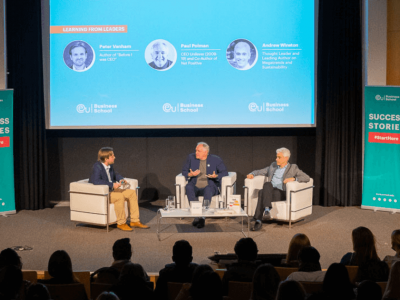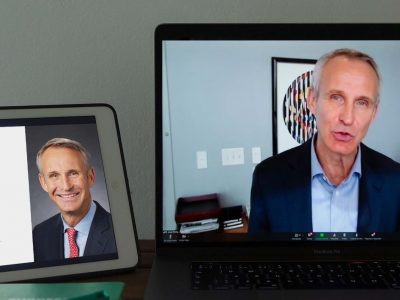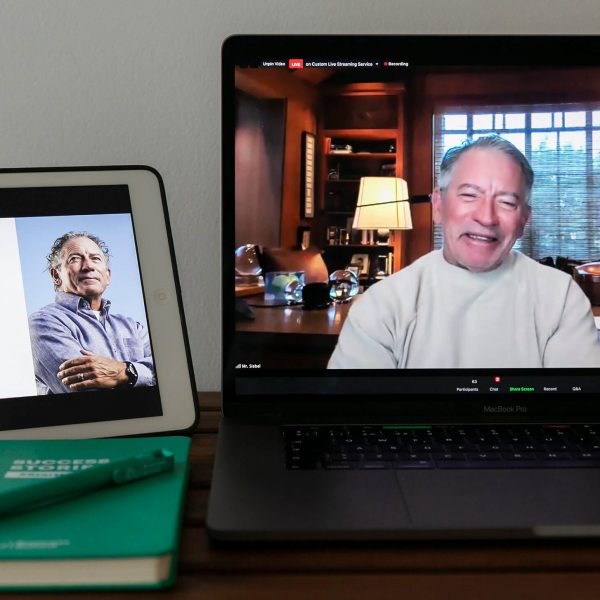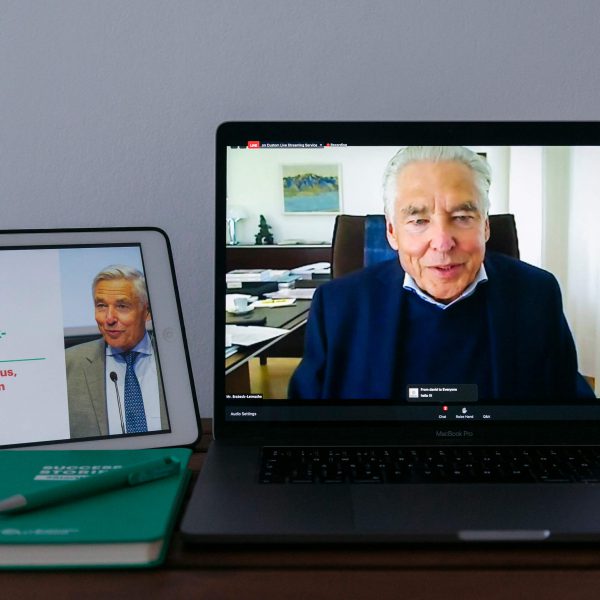Insights From Jean-Claude Biver, LVMH Group, Non-Executive President of the Watch Division, Chairman of Hublot & Zenith Watches
Jean-Claude Biver has been lauded as the savior of the Swiss watch industry. After an hour of energetic, insightful and entertaining conversation at our latest Learning From Leaders conference, it was easy to see why. Mr. Biver told stories, re-enacted seminal conversations and shared wisdom from his impressive career, demonstrating the passion that has driven him since he first developed a love for the Swiss mechanical watch.
The deep dive interview of Jean-Claude Biver, LVMH Group, Non-Executive President of the Watch Division, Chairman of Hublot and Zenith watches, by Peter Vanham, author of “Before I Was CEO”, was incredibly informative and Biver responded to EU students’ perceptive questions with career-shaping insights and advice.
The event can be watched in full here. We’ve crystalized some of the key themes and ideas that Mr. Biver shared below.
The Journey to the Top
An integral part of understanding how a leader has gotten to where they are is to explore their career journey. For Jean-Claude Biver, this started aged 10 when his parents moved from their native Luxembourg to Switzerland so that he could attend boarding school there. And so began a love for the country which has shaped his entire life, not just his passion for watches. Now 71, Biver has lived in Switzerland for 61 years and considers himself Swiss.
After graduating from a university in the same city as his school, chosen because he did not want to leave a place he’d grown to love so much, Biver spent a year with watch manufacturers Audemars Piguet, learning, watching and listening. Having been hired as a sales manager for Europe, he was given no office, no business cards, no assistant and no work. Instead, Biver was charged with the sole responsibility of learning. He spent all his time observing and getting to know the craftsmen at each stage of production so that he could truly understand the process and culture of watchmaking. That year spent in the beautiful but cold Vallée de Joux, in a village which didn’t even have a cinema, was perhaps the most formative experience of Biver’s life. He remarked, it was “the biggest asset I ever got because I entered the world of making watches.”
Then, with his friend Jacques Piguet, Biver bought historic watch brand Blancpain. Now described as the oldest surviving watch brand in the world, the company had been rendered obsolete by the emergence of the quartz watch in the 1970s. Rather than embracing the new quartz technology, Biver and Piguet doubled down on the history, timeless craftsmanship and longevity of the traditional Swiss mechanical watch, and in doing so changed the fortune of the brand. Having bought the name for CHF 22,000 (Swiss francs) in 1981, they sold to The Swatch Group for CHF 60 million in 1992.
Biver recognizesin hindsight that the sale of Blancpain was a mistake but does not regret his decision. At the time he was nervous; interest rates in Switzerland has risen steeply jeopardizing the company and he was, in his own words, “too young and too weak”. The Swatch Group (then known as SMH Group), set up to ensure the survival of the Swiss watch industry through the quartz watch crisis, made an offer they could not refuse. “It was a wrong decision, but in this wrong decision many positive elements came.”
Having sold Blancpain, Biver went on to enjoy an incredibly successful career at The Swatch Group; what had been a mistake became an opportunity to learn and grow. He joined the board, with all the attendant learning opportunities, and was given the responsibility of turning around the Omega brand, while remaining as CEO of Blancpain.
Then, after incredible success with Omega, in 2004 Biver left Swatch and joined Hublot as CEO and a member of the board.
How to Build a Brand
Throughout his career, Biver has built up and turned around watchmaking brands that were on the edge of obsoletion. It is no wonder then, that he is credited with saving the industry. At Hublot, Biver brought his unique business philosophy together with his experience from Blancpain and Omega to revolutionize the brand’s strategy.
At Blancpain, the focus had been on heritage, craftsmanship and tradition that stands the test of time.
At Omega, Biver had been the first to use influencers before they were called influencers, working with celebrities and carefully considered product placement to increase the prestige and desirability of the brand. Omega watches were seen in Bond films and on the wrists of model Cindy Crawford and Formula One driver Michael Schumacher.
Combining these two approaches at Hublot, Biver championed the ‘art of fusion’, bringing together tradition and innovation to reach his younger target audience. They started making expensive watches from carbon which was previously unheard of; watches of that cost and caliber had previously only been made of gold, platinum or steel. And using new materials enabled them to bring color to their watches.
The new approach required a new sales angle. Biver emphatically explained to the audience that, as carbon was the material that went to Mars, while gold was beloved by Egyptian pharaohs, why would young people choose pyramids and history over Mars and the future? Biver was telling a story through the brand decisions he made that would appeal to their chosen target audience. The new material and approach they were taking represented tomorrow, while the precise mechanics and quality of the watches they made represented the very best of yesterday.
Again, using a strategy that combined influencers, sponsorship and careful product placement, Hublot followed their customers wherever they went. They worked with boxers, footballers, musicians and models to ensure that the brand remained relevant to their young customers, and that their watches remained desirable. Biver recognized that he could reach new markets through partnerships in boxing, for example, where the cost of ringside seats in Las Vegas reached many thousands of dollars. He went after diversity of partnerships, understanding that his audience could be found among the avid and wealthy fans of a range of activities and lifestyle icons.
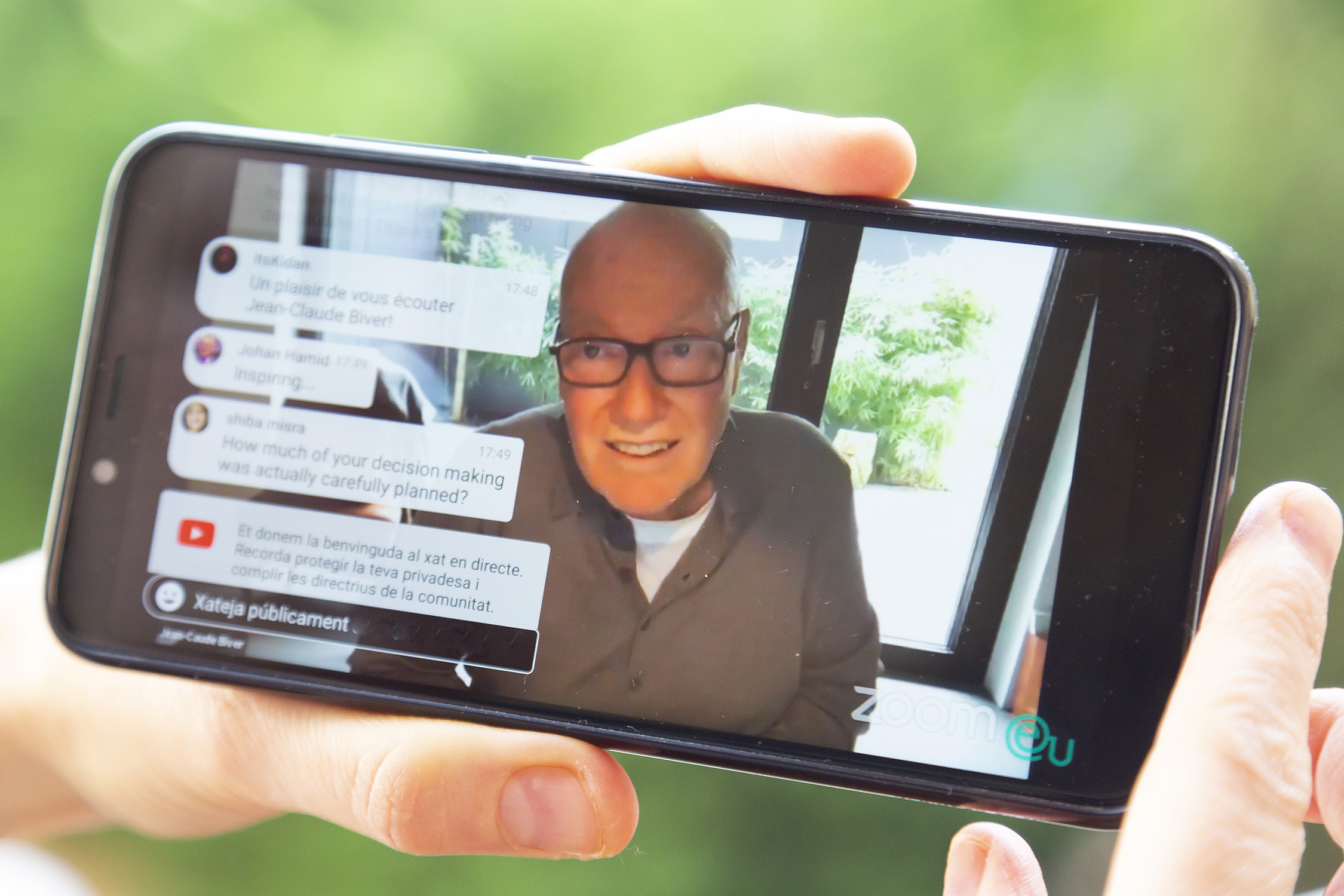

Following the acquisition of Hublot by the LVMH group in 2008, Biver stayed with the company and in 2014 was appointed President of the Watches Division of LVMH group, overseeing Hublot, Zenith and TAG Heuer brands.
Reflecting on an extraordinary career, Biver acknowledged that his children had been his biggest teachers. They’d helped him to stay young and relevant, with his son memorably pointing out Cara Delevingne during a family meal at Nobu in London and urging his dad to work with her.
When asked ‘what’s next?’ Mr. Biver’s response was “to give back. When you have received so much – I must give back, I cannot leave in keeping all this for me […] that’s my last mission, it’s not the easiest one, it’s probably the most difficult one, but I have to succeed at giving back.”
This attitude is typical of Biver’s distinct and fundamentally generous business philosophy.
A Philosophy for Success
Between 1967 and 1971 Biver was a hippy. He read the books being passed around the commune he lived in, including works by Mao and Confucius. What he read and learnt during that time formed his later approach to business.
The teaching ‘only dead fish swim at the speed and in the direction of the stream’ informed Biver’s decision to always be first, different and unique. “When you are obsessed to never think like others, when you are obsessed to be different, when you are obsessed to be first, when you are obsessed to be unique, then, suddenly you think out of the box. And when you are out of the box then the whole world is there, open for you.”
Being a contrarian undoubtedly contributed to Biver’s astronomic success, first manifesting in his refusal to bow to the pressure of the new quartz technology and to remain steadfastly traditional. Biver has celebrated the Swiss mechanical watch above all others, throughout his career.
Elaborating on why he had done so, Mr. Biver posited that, by making a mechanical watch that lasts hundreds of years (like the iconic and reliable Big Ben), you can promise your customers eternity. A watch made by hand and with a long heritage has soul, whereas watches made by robots and machines do not. Products of technology will one day become obsolete.
To further illustrate this point, he compared the Apple Watch (of which he is a fan, he owns two) with a cost of several hundreds of dollars, to a Hublot or similar luxury mechanical watch, which costs hundreds of thousands of dollars. One, he said, is like owning a Picasso, the other, a replica of the Picasso. The original has history, has soul. The replica is disposable. A Swiss mechanical watch is art whereas a digital watch is a technological product with a limited shelf life. Which is why, he concluded, the Swiss watch industry has been, and will continue to be, so resilient.
The final element of Biver’s philosophy is the fundamental importance of passion. He recognizes that his energy, ideas and inspiration all flow from the passion which he found and nurtured. “I was not born with a passion for watches I developed it […] and I wanted to find in the watches my steam machine which I loved when I was a little boy.”
What A Leader Looks Like
Biver is looked up to by many students and professionals as an inspirational model of great leadership. When asked about leaders that he’s admired, Biver first stated what he believes to be the fundamental attributes of a successful leader: simplicity, authenticity and humility. “The more you see successful people, in sport, in business, in art, the more you will notice that they are humble, the more you will notice they are always ready listen, the more you will notice they will take time to explain to you, the more you will notice that they need others to help. So, this is the key.”
He cited two examples of leaders who have inspired him.
- The first was Nicolas George Hayek, founder of the Swatch Group. “The office would always be open; he was always ready to help.” “You could call him at 6 a.m., at midnight – he would answer the phone.”
- And he named Gérald Genta, a famous watch designer and an influential mentor to Biver. Genta urged him, “every time you have a question, for anything, ask nature.” And Biver encouraged EU students to do the same.
Biver also mentioned footballer Cristiano Ronaldo, whose incredible work ethic stemmed from an unswerving passion for football. “He never wanted to leave the stadium”, Biver recalled, from meeting the footballer several years back. It’s an attitude that Biver admires. When he was starting out with Blancpain, Biver didn’t draw a salary. Instead, to minimize the risk, he worked nights as a postal worker and during the day rebuilt the brand.
Passion has enabled Biver to work tirelessly throughout his career, infecting his colleagues and customers with the same enthusiasm for his products, ensuring his success: “that’s why we were successful, because we transmitted our passion, the way we talked about our watch was totally different from others.”
Sustaining the Future
Advice frequently given by speakers in our Learning From Leaders series is to be adaptable. Similarly, Biver emphasized that “the industry will have to adapt if they want to stay alive.” The luxury sector must continue to evolve to accommodate shifting consumer priorities and environmental realities.
There is already a consciousness of ethics within the industry. Standards exist to track the provenance of leather, for example, and to ensure companies are not purchasing blood diamonds. Yet Biver acknowledged that this is not enough.
“We should be leaders because in the luxury industry you can put in your price the cost of sustainability, which you cannot necessarily when you sell a t-shirt for $3. So, we must be an example, we must be at the forefront of sustainability. That is a mission of luxury. And after the virus this mission will become stronger and stronger and we must now, the luxury industry, take the lead.”.
Sage Career Advice
Mr. Biver shared a multitude of tips to inform career success throughout the conference. Here are some of the most pertinent points he made. (And remember, you can find the full event recording here.)
“If you have no curiosity, if you are not asking questions, your passion will not come.”
Biver advised students to find their passion, a goal which felt all the more compelling given his unbelievable energy and enthusiasm for the duration of the event.
“Find a way to convert your passion into your job, or your job into your passion. ”
Biver shared an anecdote about encouraging the watchmakers at Blancpain to embed each screw (of which there are 80) in each watch with positive thoughts about their work such as‘I love my job’. He believes that this positivity and passion came through in the finished product as well as ultimately leading to greater job satisfaction.
“Don’t go into any field, don’t start anything, without experience.”
Experience is key to success, he said, particularly in luxury. Join a brand, listen and grow and then, if you want to start your own company, you will be prepared. Education is important but experience is even more so.
“Learn to learn”.
After leaving formal education, when no one is giving you “the drink of knowledge” it is up to you to continue to learn and grow.
“You must have the courage to be wrong. And the courage to be wrong is the most important element that an entrepreneur must have.”
It was courage that led him to spend eight years developing a hugely successful ceramic watch in Ferrari red. Have the courage to fail and learn from your failures while you are young, he advised, while there is still time to correct your mistakes!
“Befriend doubt; it is your friend and provides that essential double check on your ideas.”
“Develop partnerships and listen to your partners; you cannot do it alone.”
Responding to the Crisis
Mr. Biver also had several valuable insights to offer leaders and businesses trying to navigate the economic fall-out from the global spread of coronavirus.
- Be active; “Usually in big crises, people are in panic and when they are in panic, they don’t move. I would be extremely, extremely active. I would be moving like crazy.”
- Be creative; invest in research and development. “When you cannot sell, then prepare for the future. And the future is in innovation and creativity.”
- Be in touch; “You should never lose contact because when you lose contact you have to recreate contact afterwards.” Don’t lose contact with your customers and your distribution network. People will remember you for being there and thinking of them.
- Promote the fact that the crisis is your friend, not your enemy. “Because if the crisis is my enemy I have lost.”
- Accelerate; “In a crisis there is huge energy. Take the energy and bring it up. It means that in crisis, there are opportunities.”
- Sell emotion not technology; “You must think, how is the psychology of people during a crisis? In crisis people will need love. Love is an antidote to the crisis. Love is emotion, love is color […] So, I would work on seducing the customer through emotion, not so much through technology. because that’s what people will need after the crisis. People will need dreams again, colors, to see the future.”
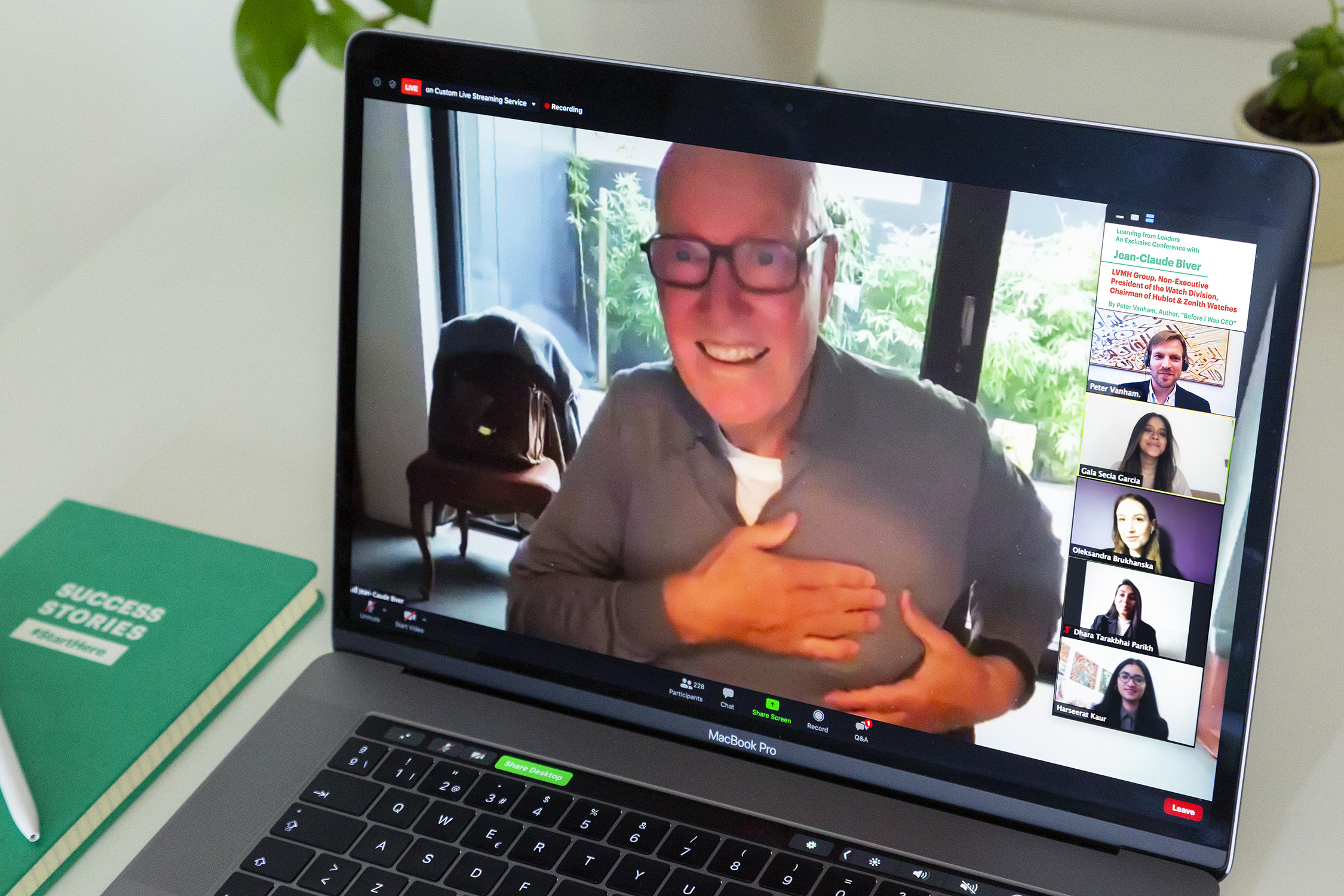

He also recounted the simple yet effective strategy employed at Hublot to generate business during the pandemic. Limiting supply has always been a key element of Biver’s approach to maintaining desirability, and so, over the course of just one day, they offered luxurious, and importantly safe, personal shopping appointments in store for a customer and their friends or family. They only had ten instead of the usual 80 customers they’d see in a day, each of whom stayed in the store for an hour or two. However, those ten customers, Biver remarked, will always remember that Hublot gave them the opportunity to “be served like a king”. And of the sales made that day, one was for a watch that cost $1 million, proof that their simple strategy was incredibly effective.
Given his remarkable career and meteoric success, it’s unsurprising that when asked what he would change if he could do it all again, Biver responded, “Nothing different! Because all my mistakes, all my failures, all my errors, have heled me to develop myself, have helped me to come further.”
Embracing the Future
Learning From Leaders will continue with Helena Hedblom, President and CEO of Epiroc on May 28, 2020, who will be discussing women and leadership.
This exclusive conference series is characteristic of the approach EU Business School takes to business education. Students at every level from bachelor’s to MBA are encouraged to learn and understand the fundamental theories and facts of business, while familiarizing themselves with trends and opportunities that exist at the cutting edge.
Adaptability, as John-Claude Biver noted, is key to business success. Exemplifying this behavior, EU Business School has embraced the challenge presented by the global health crisis and is offering on-campus students a seamless, engaging and interactive digital experience that ensures they continue to progress and learn, despite the worldwide pandemic pressing pause on life as we’ve known it.
For a business education that prepares you to recognize opportunities, embrace change and race ahead of the competition, choose EU Business School. Whatever the situation is in October, we have a solution to ensure that you don’t have to put your future on hold.




